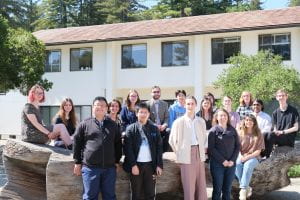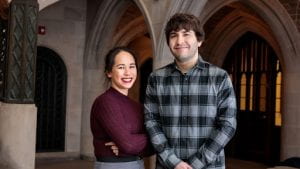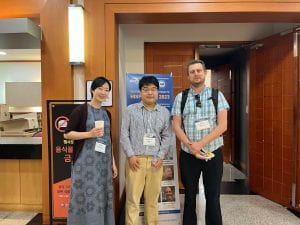 On June 2, students and faculty in the department gathered for the Linguistics Undergraduate Research Conference (LURC). This annual conference celebrates the groundbreaking research of Language Studies and Linguistics majors and is always a highlight of the department’s academic year calendar.
On June 2, students and faculty in the department gathered for the Linguistics Undergraduate Research Conference (LURC). This annual conference celebrates the groundbreaking research of Language Studies and Linguistics majors and is always a highlight of the department’s academic year calendar.
This year’s LURC was no exception, featuring nine posters on a range of topics in phonetics, phonology, psycholinguistics, syntax, and semantics:
- Cal Boye-Lynn, Killian Kiuttu, and Mackenzi Rauls: Everyone loves complements: Complementizer-determiner ambiguity and acceptability
- Tony Butorovich, Claire Wellwood, and Max Xie: Production of English /r/ by prosodic position
- Sophie Green, Shaya Karasso, and Josh Lieberstein: Ambiguity Advantage Effect in Wh-questions
- Nicholas Hanson: Conveyances of sarcasm in written language
- Colin Hirschberg: Affectedness in passives
- Sadira Lewis: Events and ambiguity in -er nominals: An experimental approach
- Stephen Migdal: “At least,” QUD, and Pragmatic Enrichment of NNPs
- Wilson Wenhao Sun: OT account for consonant clusters in Cantonese loanword phonology
- Nishant Suria: A phonetic investigation of the retroflex approximant in Tamil
After brief presentations and a discussion period, the Distinguished Alumna Speaker Caroline Andrews (BA, Linguistics, 2011) spoke on “Optionality and commitment: Sentence planning in an ergative language.” Dr. Andrews received her PhD from the University of Massachusetts, Amherst in 2019, and she is currently a postdoctoral researcher at the University of Zurich.



















